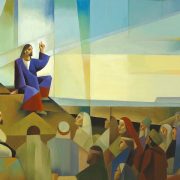
It is an understatement to say that 2020 is a year like no other. The COVID-19 pandemic in and of itself is one of the most significant challenges that the world has faced in generations. However, it isn’t just the virus that is the challenge. The inequity of how the virus affects people of color has been the catalyst that has brought to light many inequities. It is in the midst of the pandemic that the Black Lives Matter grew from a social media hashtag to a global movement. Considered one of the largest movements in history, Black Lives Matter protests have spread to now include schools, churches, businesses, and even professional sports.
We asked several Dehonians in North America to reflect on this moment in history. In their own words, they share their personal thoughts.
We are called to live together in accepting our diversities
Fr. Gustave Lulendo N’dotony, SCJ, originally from the Democratic Republic of Congo, is a naturalized Canadian citizen. A member of the Montréal community, he is the regional superior of Canada. Fr. Gustave writes:
Coming from a country that has experienced slavery, colonization, dictatorship and then war, it is quite natural to react to discrimination in all its forms, and to injustice, especially when it tends to be institutionalized. With the greater awareness of the Black Lives Matter movement following the death of George Floyd, we have seen how humanity can react and respond to those who hold “anti-values”. Black Lives Matter is no longer just a slogan but an action plan to denounce or even eradicate racism. Different voices have risen up, seeking to change things in the present, but above all, to create a better future for all humanity. Racism is only the tip of the iceberg which hides a great deal of discrimination. Fighting against this scourge in particular is a commitment to seeing things change.
It is not only a question of protecting a minority judged by the color of its skin, but of the commitment of all of humanity against discrimination based on sex, religion and race, just to name a few. It is the aim of a humanity concerned with making the earth a common place where everyone has the same fundamental rights which promote their dignity. To remain silent to this phenomenon is to accept exclusion and deny a category of people the right to exist.
By vocation, we are called to live together in accepting our diversities – which can become opportunities – rather than dwelling on what differentiates us.
As Priests of the Sacred Heart, we are heirs to a tradition based on love and acceptance of the other as a gift. The Sint Unum dear to our founder, Fr. Dehon, can thus become a springboard and a response to the question of discrimination. This requires education, and the commitment of all to concrete acts in their daily living.
“Love one another; as I have loved you”. (Jn 13, 34-35) It is up to everyone to live this, wherever they are, if we want to experience humanity as the family that it is.
Do not be conquered by evil but conquer evil with good
Fr. John Czyzynski, SCJ, former provincial superior of the US Province, is now a retired member of the community at Sacred Heart at Monastery Lake in Franklin, Wisconsin (US Province). He writes:
The protests that are going on in the United States and around the world have made me reflect a lot about what is going on. For me, the peaceful protests make all kinds of sense. People have seen enough, and it is time to do something to bring about change. I can easily understand and support people peacefully marching in the streets, calling for reform.
What complicates the issue is the violence and looting that at times accompanies the peaceful protests. How can I make any sense out of that? As I read and reflect about the protests that have turned violent, I see different groups of people, different motives behind the destruction.
I think that there are good people who have suffered for years from systemic injustice. They have tried – to no avail – to bring about peaceful change. They have given up on the system. They tried doing things following proper channels and no one seems to be listening. In their rage and desperation they have turned to violence. They are screaming out to us: “If you won’t listen to us when we use words, all we have left to get attention to our plight is to upset what everyone sees as normal.” “Normal” being a way of life that is often enjoyed by only some citizens and not others. As much as I don’t like it, I can understand some of the violence as seen from this perspective.
But then there are the opportunists who take advantage of a situation to rob and loot. They are not promoting the cause of the oppressed. They are using the situation to help themselves.
I also wonder if there are some people who want to give a bad name to the well-intentioned protestors, the peaceful protestors, and discredit their efforts with violence as a way to offset the good that they are attempting to bring about.
I plead with those creating violence to stop, to not be an obstacle for those trying to protect the dignity of their brothers and sisters. I don’t know if their hearts are open to hear me, but I hope that they are.
Knowing that desperation can lead some to violence I share a variation of what St. Paul says to the Romans (Romans 12:20-21):
“If your enemy is hungry, feed him, if he is thirsty, give him something to drink; if you do this you will heap burning coals upon his head. Do not be conquered by evil but conquer evil with good.”
This sad reality should particularly touch our Dehonian hearts
Fr. Willyans Rapozo, SCJ, a member of the Toronto community (Canadian Region) who is originally from Brazil writes:
We have recently witnessed a number of racist and xenophobic events in North America which have caused deep indignation and raised protests throughout the world. This sad reality should particularly touch our Dehonian hearts. Following the example of Fr. Dehon, a man of God who in his time became a prophetic voice defending the most vulnerable, we cannot be quiet in the face of any social injustice. In fact, the Founder once said, “If social injustice is not sin, then sin does not exist.”
As Dehonians, we are called to repair broken hearts, and God continues to send us to wherever human dignity is been disrespected. We see the face of Christ in the marginalized. He is being persecuted, beaten, and killed in Black and Native Americans, migrants and homeless children, LTBTQ+ and single mothers, all sisters and brothers who are victims of any form of discrimination and violence. Let us be creative in finding ways of “leaving the sacristy” and reaching out to those who are being exploited. Let us truly be “prophets of love and servants of reconciliation” welcoming the outcast and showing through our words and actions how much they are loved.
When we allow God’s voice to be heard, we will be able to hear the voices of our sisters and brothers
Fr. Guy Blair, SCJ, ministers to the deaf in San Antonio (US Province) and serves as a chaplain at the State Mental Hospital. He writes:
Sharing my thoughts about racial unrest and the Black Lives Matter movement is risky business. I am somewhat conflicted doing so because many powerful voices are telling me – a white man – to sit down, shut-up, listen and learn the truth from others. This I understand. The voice is holy.
While I recoil at the violence and destruction which has been part of the “reckoning”, I can understand the frustration and outrage Black people feel toward systemic racism in our country, which has been exposed even more clearly by the pandemic. Our country, our culture, our way of living has continued to steal the lives of Black people by inadequate health care, inadequate educational opportunities, inadequate housing; it is too egregious to deny. Equally distressing as the cries of the Black community are the reactions of many white people seemingly unable to at least be sympathetic to voices asking simply to enjoy the same rights as all American citizens, rights that many white people take for granted.
I comprehend the symbolic nature of the looting and burning of businesses and property. In the United States, it is of the utmost importance to own property. So much of our lives is focused on building and caring for property and handing it on to progeny. Many consider property as sacred. Thus, many are outraged when some in the Black community have the audacity to destroy what feels sacred. It is appalling that there are many people who see the violent actions of the police toward the Black community as warranted. It is appalling to see people who are more upset about the destruction of property than about the destruction of Black lives.
“Black Lives Matter” has become a metaphor for all the people we white folks – and I include myself – haven’t paid attention to, or have taken advantage of, including Native Americans, members of the LGBTQ community, Hispanics, the homeless… the list of those often shut out of “life, liberty and the pursuit of happiness” is quite long.
I have not heard from our American church leaders a consistent, united, definitive voice expressing moral outrage for the atrocities committed against all these people in their struggle. However, I have heard a clear pandering voice by some church leaders toward the president and the status quo. Truth be told, all churches have been complicit in the very systems that have often denied people their rights. This is difficult to admit, but others are increasingly willing to reveal the church’s connivance with power.
Black lives do matter, just as Native American lives do, LGBTQ lives and homeless lives. It is specious for white people to insist that white lives matter too. That is the problem in the United States: white lives have always mattered and have often cast a shadow that blocks the lives of others.
I wonder too if another reckoning is looming in our church, that women’s lives matter.
We cannot dare as church to point the finger of outrage at government or society regarding racism because we also have an insidious racism called “patriarchy”. For 2,000 years the church has often kept women in second place.
Recently, I was the presider at a liturgy for a young woman making her first vows in a religious community. I welcomed her with the comment “It takes a great deal of courage to step onto this boat with us, believing it is the Ark and not the Titanic.”
As I spoke those words, I felt the same interior resistance as I do expressing my white opinion about “Black Lives Matter”.
I’ve made peace with the knowledge that I might have a ticket on the Titanic. But I do so knowing that in the end, God is love, and all that seemingly holds power in our earthly life – including a white, male-dominated culture – will eventually be worn down by God’s love.
When we allow God’s voice to be heard, we will be able to hear the voices of our sisters and brothers.
Leaving the sacristy means going out to the world with all its challenges
Fr. Rafael Querobin, SCJ, originally from Brazil, is associate pastor of Our Lady of Guadalupe parish in Houston, Texas (US Province). He writes:
Our ministry in Houston is dedicated almost exclusively to people of Hispanic background. We don’t have many African American people who attend our parish regularly. I can now understand what it means to have the same faith but not pray together. I am happy to hold a vital ministry with people who speak Spanish. At the same time, I feel that our assembly is not complete.
Language can be a dividing element, like any other thing that sets us apart. I have many questions, but not many answers.
The Archdiocese of Galveston-Houston is doing beautiful work to show its concern for Black rights. I attended an event in memory of George Floyd at the school he studied at here in Houston. It was a beautiful and challenging experience. However, for the first time in my life, I felt a particular fear as a white man attending an event dedicated to African Americans.
As Dehonians, we need to overcome fear and be open to participating in events and discussions of this kind. Leaving the sacristy means going out to the world with all of its challenges.
As Dehonians, we must be attentive to all manifestations of discrimination
Fr. Maurice Légaré, SCJ, grew up in French-speaking Quebec and is a member of the Montréal Community (Canadian Region). He writes:
BLACK LIVES MATTER! This is the slogan that we hear and read throughout the world. However, I would like to widen its significance. It certainly refers to manifestation of racism against our Black brothers and sisters, especially extreme manifestations where people have died or were seriously injured. But we must not forget that all minorities may be the object of discrimination. This is the case, for example, with First Nations in North America [known as “Native Americans” in the United States]. Discrimination is often subtle but still significant. Recently a member of my community, a Black man, had his car examined because “in that neighbourhood, it is unusual to see a Black person driving such a car”, said the police officer who stopped him.
These are things that many of us know about but don’t always consider to be important because they don’t happen “to us.” But it is different when something like this happens to you, or to a person close to you.
As Dehonians, we must be attentive to all manifestations of discrimination and support its victims because we strongly believe that we are all brothers and sisters. As much as we can, we should also denounce such behaviours and try to educate people to whom we minister to do the same.
I pray that one day we can say: “There is neither Jew nor Greek, there is neither slave nor free person, there is not male nor female; for you are all one in Christ Jesus” (Galatians 3, 28) and that ALL LIVES MATTER!






i think so, we are all sons of God, so its important to teach our people these things
Im uruguayan dehonian consagrated My fraternity is Oblatas del cuore de Jesu.
Next year I’m living in Montreal. because my family emigrated 15 years ago,
I hope we are going to be close.Please leave me in contact
I studied theology for 9 year and I have an audio programme at radio Maria Uruguay
Its Cristificandonos , on Wednesdays at time 16 here in uruguay.
my regards
VIVAT COR IESUS PER COR MARIE